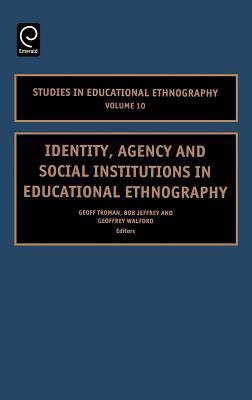
Bedankt voor het vertrouwen het afgelopen jaar! Om jou te bedanken bieden we GRATIS verzending (in België) aan op alles gedurende de hele maand januari.
- Afhalen na 1 uur in een winkel met voorraad
- In januari gratis thuislevering in België
- Ruim aanbod met 7 miljoen producten
Bedankt voor het vertrouwen het afgelopen jaar! Om jou te bedanken bieden we GRATIS verzending (in België) aan op alles gedurende de hele maand januari.
- Afhalen na 1 uur in een winkel met voorraad
- In januari gratis thuislevering in België
- Ruim aanbod met 7 miljoen producten
Zoeken
Identity, Agency and Social Institutions in Educational Ethnography
€ 246,45
+ 492 punten
Omschrijving
The prime focus on the social processes of schooling within educational ethnography has tended to marginalise or eschew the importance of other 'informal' educational sites. Other social institutions, such as family, community, media and popular culture, work and prisons are salient arenas in which behaviours and lives are regulated. They all interrelate and are all implicated in the generation, management and development of social identities and the social and cultural reproduction of structures and relations. Individuals, though, are not merely shaped by these social institutions, their agency is evident in the way they creatively adapt and accommodate to the tensions and constraints of economic, educational and social policies. The maintenance of self in these situations requires identity work involving mediation, conflict, contestation and modes of resistance, which often contribute to a continual reconstruction of situations and contexts. This volume of "Studies in Educational Ethnography" focuses on identity and agency in a variety of social institutions in educational ethnography. The contributors explore these themes in a wide range of international contexts including: Belgium, Sweden, North America, South Africa and England. They demonstrate the capacity of educational ethnography to provide accounts of participants' perspectives and understandings to highlight the agency of educational subjects.
Specificaties
Betrokkenen
- Uitgeverij:
Inhoud
- Aantal bladzijden:
- 244
- Taal:
- Engels
- Reeks:
- Reeksnummer:
- nr. 10
Eigenschappen
- Productcode (EAN):
- 9780762311446
- Verschijningsdatum:
- 30/12/2004
- Uitvoering:
- Hardcover
- Formaat:
- Genaaid
- Afmetingen:
- 166 mm x 232 mm
- Gewicht:
- 480 g

Alleen bij Standaard Boekhandel
+ 492 punten op je klantenkaart van Standaard Boekhandel
Beoordelingen
We publiceren alleen reviews die voldoen aan de voorwaarden voor reviews. Bekijk onze voorwaarden voor reviews.








